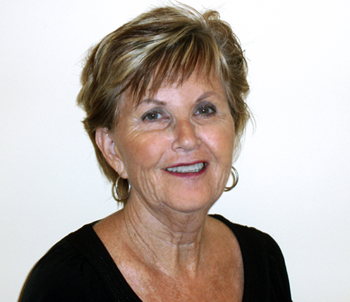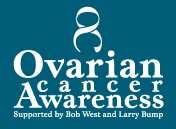Signs and Symptoms:
- Vague but persistent and unexplained gastrointestinal complaints
- Pelvic and/or abdominal swelling or pain; bloating and/or feeling of fullness
- Unexplained change in bowel habits
- Frequency and/or urgency or urination
- Unexplained weight gain or loss
- New and unexplained abnormal postmenopausal vaginal bleeding
Risk Factors:
- Peri or post-menopause
- Uninterrupted ovulation (no pregnancies and no prior use of oral contraceptives)
- Family or personal history of breast/ovarian cancer
- Presence of BRCA 1 or BRCA 2 gene mutations
Prevention:
- Use of oral contraceptives for 5+ years
- Multiple pregnancies, breast feeding
- Removal of ovaries or tubal ligation – procedures may reduce, but not entirely eliminate risk
|
"Ask Anna"

Common Questions Asked When Newly Diagnosed
- Why Me?
No one can say for sure. Why some women get ovarian cancer and others do not is unknown in the majority of cases. However, scientists have found that certain risk factors increase a woman's chance of developing this disease. Risks include a family history of ovarian cancer, age (most ovarian cancers develop after a woman has gone through menopause), your reproductive history (starting menstruation at an early age (before age 12), not having children or having your first child after age 30, and experiencing menopause after age 50, and a history of breast cancer.
For more information, click here.
- I am too young.
Unfortunately, cancer has no discrimination on age.
Age of Ovarian Cancer (2003-2007, Source: National Cancer Institute)
| Age at Diagnosis |
Percent of Women |
| Under 20 |
1.3 |
| 20-34 |
3.5 |
| 35-44 |
7.4 |
| 45-54 |
19.2 |
| 55-64 |
22.9 |
| 65-74 |
19.5 |
| 75-84 |
18.4 |
| Over 85 |
7.8 |
The important thing to remember when reading statistics is that they represent such a small percentage of women who actually have ovarian cancer. As you probably found in your diagnosis, ovarian cancer can be very difficult to detect, but thanks to outreach efforts and research, survival rates are increasing. You can beat this.
- How did I get this?
Ultimately, the cause is unknown.
Ovarian cancer may result from a chemical agent that somehow penetrates the vagina, uterus and fallopian tubes, affecting certain genes in these cells, which might explain why hysterectomy and tubal ligation protects against the disease, according to the American Cancer Society. OCRF researchers are trying to identify the genes implicated in sporadic ovarian cancer to better understand what causes the disease, how to diagnose it earlier and to develop better treatments.
Inherited mutations in the BRCA1 and BRCA2 account for 10 percent of all epithelial ovarian cancers. These mutations are often found in families with a strong history of ovarian or breast cancer. A woman gets these flawed genes from one or both of her parents and the mutation present in every cell of the body increases her risk for both ovarian and breast cancer, as well as other cancers.
For more information, click here.
- What do I do to get well?
Make sure that you see a gynecologic oncologist. This type of doctor will manage the treatment and surgery for your type of cancer. The goal of treatment for ovarian cancer is to surgically remove as much of the cancer as possible (called “debulking” or “cytoreductive surgery”) and then to provide what is called adjuvant, or additional therapy, such as chemotherapy, to kill any possibly remaining cancer cells in the body. Radiation therapy, which uses high energy rays to kill cancer cells, is not typically utilized in ovarian cancer.
For more information, click here.
- How long will it take to cure me?
Each individual faces a different treatment protocol and a different journey with ovarian cancer.
- Can I still work?
If you have worked before, sometimes you are encouraged to continue the routine that you have been doing. It’s ultimately an individual choice to make. Sometimes it takes your body time to adjust to the treatments. Individuals can decide how much they can do once they have adjusted to the treatments.
For advice, click here.
- Will my family catch this?
No. Ovarian cancer is not contagious. However, studies have shown that ovarian cancer is hereditary and the gene can be carried by both men and women. You may want to consider genetic testing to determine if any of your children are at risk.
- Do I need to eat special foods?
It is important to try to maintain a healthy diet while undergoing treatment. You may be advised to avoid certain foods depending on your blood tests as your treatment progresses.
- How much do I need to know?
Make sure you have good communication with your doctor and staff. Don’t hesitate to ask them any questions or address any concerns you may have. They are there to help you and they will provide you with all the information you want and need to know. Our website is dedicated to providing as much information as possible about ovarian cancer and is a good place to start when you have something you want to know.
- How can I be happy under these circumstances?
I encourage everyone to believe in themselves and continue to live every day of life to the fullest. Sharing my goals and concerns with my loved ones created a circle of support that helped me get through the harder times.
If you need to speak with other women who have been where you are, please join us for our Anna’s Belles support group. We meet the third Saturday of every month at Cancer Treatment Centers of America. Our meetings begin at noon and usually last about an hour.
|
|

